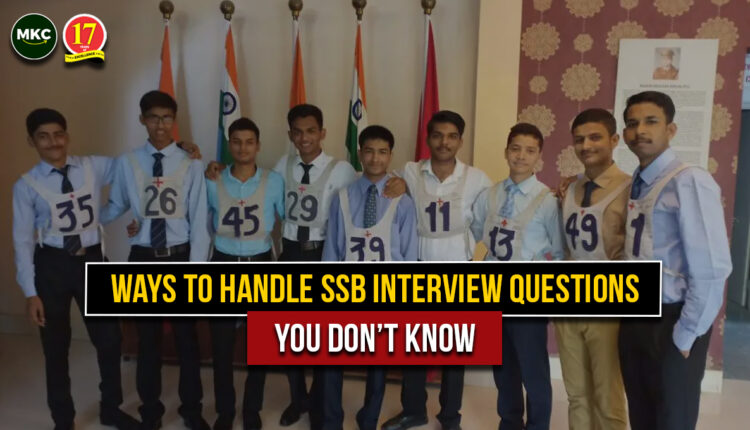Ways to Handle SSB Interview Questions You Don’t Know
Many people get scared when they can’t answer a question in an interview. It happens a lot. Sometimes, we just don’t know the answer and it feels terrible to stay silent. Other times, even if we know the answer, our minds go blank. In those moments, we wish we could disappear.
Being ready for not knowing an answer can make things less stressful. It helps you handle tough situations better.

Follow these tips during SSB Interview
- Stay calm during an SSB interview. Your mindset is super important for success. Many people think they need a perfect interview, but that’s not true. Even if you don’t answer every question perfectly, you can still do well.
- Remember, other candidates might struggle too. So, don’t panic if you can’t answer a question perfectly. It’s okay to not know everything. Take time to learn about common interview questions beforehand.
- If you can’t answer right away, stay calm. How you react is key. Stay confident and composed. If you’re unsure, it’s better to say you’ll find out later than to make up an answer. The interviewer can tell if you’re not being honest. So, take a few seconds to think before you respond. It’s better than saying “I don’t know” right away.
- If you’re unsure of the answer, share your thoughts with the interviewing officer. Even if you only know part of the answer, it’s helpful to speak up. Talking it through out loud might help you figure it out.
- You can also explain how you’d go about finding the answer. The officer wants to see your problem-solving skills, not just the correct answer. So, talk about the steps you’d take to solve the problem. It’s okay to admit if there are parts you don’t know. For instance, if you’re not good at math and need to do calculations, you can say, “I’m not great at math, but I know these calculations will help me find the answer. I can use a calculator to do them.” Being honest shows that you’re willing to learn and be transparent, which can make you more likable.
- If you need more time to think, try rephrasing the question or asking for clarification. For instance, you could say, “Sir, do you mean you want an example of how I organized a team event at college?” This might help spark an idea while you wait for the IO’s response.
- Don’t hesitate to ask questions if you’re unsure about something. Asking for clarification can give you a better understanding of the question, helping you come up with a better answer.
- If you’re still stuck on a question even after the interview, you can research and prepare a strong answer for the conference. This shows that you’re proactive and willing to learn.
Approach the interview with a relaxed attitude. It’s not as daunting as it may seem. With the right mindset, you can handle it smoothly. Avoid dragging out moments and making things awkward for both you and the IO. Practice interviewing at home with family and friends to build confidence. These tips should help you feel more prepared!








